MercoPress. South Atlantic News Agency
Tag: Paul Singer
-
Sunday, June 14th 2020 - 14:04 UTC
New version of Nisman's death supplied by ex Mossad agent directly involves Cristina Fernandez
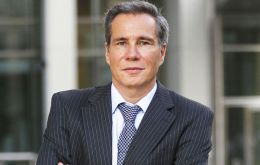
Israel’s Mossad provided the intelligence information that enabled Argentine prosecutor Alberto Nisman to prove that Iran orchestrated the 1994 AMIA terrorist bombing in Buenos Aires, in which 85 people were killed, an Israeli TV documentary claimed.
-
Monday, May 9th 2016 - 09:17 UTC
S&P raises Argentina's credit rating, but warns about the 40% inflation

Argentina’s credit rating was raised to B- from selective default by S&P Global Ratings, which cited the country’s payment last Thursday of $2.7 billion of past-due interest on bonds in default since July 2014.
-
Wednesday, April 27th 2016 - 10:44 UTC
Paul Singer praises Macri but warns about negative impact from Collective Action Clauses

Financier Paul Singer again took to the US media to celebrate Argentine President Mauricio Macri’s decision to settle with the so-called “speculative” creditors, including Singer’s own Elliott Management, with an article in the Wall Street Journal heaping praise on his business-friendly approach and willingness to negotiate with the holdouts.
-
Friday, April 22nd 2016 - 07:48 UTC
Singer praises Macri and calls him a great 'reformist' in a Time weekly column
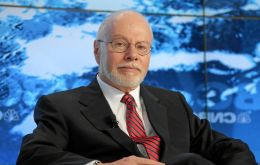
United States hedge fund billionaire Paul Singer is a big fan of Argentina’s new president. For one thing, Mauricio Macri doesn’t call him a “vulture lord” or a “bloodsucker,” as his predecessor Cristina Fernández did. More important, the newly elected Macri recently paid Singer’s firm US$2.28 billion in debt.
-
Monday, April 18th 2016 - 08:49 UTC
Argentina returns to money market for US$ 15bn to pay bondholders

Once Argentina pays the holdout funds, US District Judge Thomas Griesa will lift the injunctions against the country, court-appointed mediator Daniel Pollack said, following the appeals court ruling that cleared the way for Argentina to pay its debts.
-
Thursday, April 14th 2016 - 05:48 UTC
US court opens the way for Argentina's return to world money markets

The United States Court of Appeals paved the way on Wednesday for Argentina to raise billions of dollars to pay a group of hedge funds, bringing it one step closer to re-entering international markets for the first time in 15 years. In a ruling from the bench, three judges on the court of appeals upheld a ruling by Judge Thomas Griesa of District Court in Manhattan to lift an injunction that had barred Argentina from paying its creditors and eventually led the country to default in 2014.
-
Saturday, April 2nd 2016 - 07:04 UTC
How hedge funds held Argentina for ransom
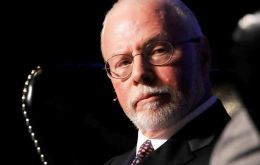
By Martin Guzman and Joseph E. Stiglitz (*) - Perhaps the most complex trial in history between a sovereign nation, Argentina, and its bondholders — including a group of United States-based hedge funds — officially came to an end yesterday (March 31) when the Argentine Senate ratified a settlement.
-
Thursday, March 31st 2016 - 22:54 UTC
Argentine congress overwhelmingly approves deal with creditors to end 15-year conflict
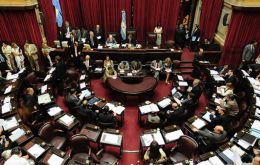
After 13 hours of debate, Argentina's senate voted overwhelmingly to approve a deal with creditors in the US, putting an end to a sovereign bonds' dispute that had lasted 15 years. The deal was reached in late February, and the Lower House passed it earlier this month. The senate began debating on Wednesday morning and on early Thursday passed the measure by 54 votes to 16.
-
Wednesday, March 9th 2016 - 05:35 UTC
Argentine Lower House clears the way for a floor discussion of accord with holdouts
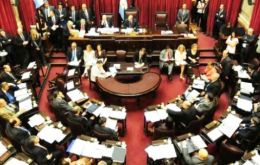
After rough discussions, Argentina's Lower House committees on Tuesday managed to clear the holdouts bill for debate with changes proposed by the allied Renewal Front and criticism from Victory Front lawmakers.The bill will reach the floor next week. If it passes, it will then be up for debate in the Senate, where the situation is similar, with the ruling Let’s Change needing help from opposition lawmakers to ensure the bill passes.
-
Friday, March 4th 2016 - 07:02 UTC
Paul Singer will have made a $2.4bn profit with the Argentine defaulted bonds
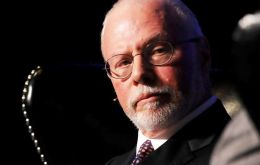
Elliott Management Corp., a New York-based hedge fund that invested in distressed Argentine government bonds well over a decade ago, will have made a $2.4 billion profit on its wager once this week's settlement is finalized, the Wall Street Journal said.
